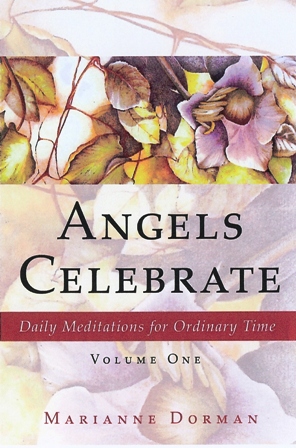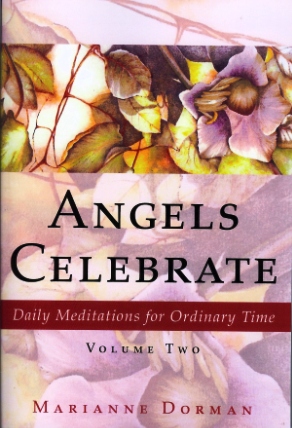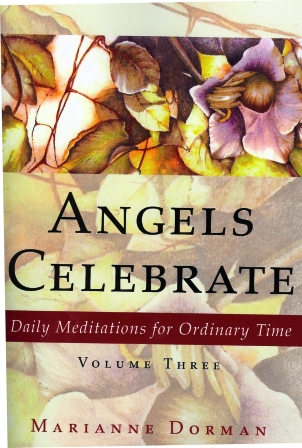ANGELS CELEBRATE
Angels Celebrate is a three volume set covering those long months of Ordinary Time in the Christian Year. There is a two year cycle that enables those who attend daily Mass or those use the daily readings at home to be exposed to a large section of Scripture.
After celebrating the major events in our Lord's life such as His birth, death and resurrection, Ordinary Time allows Christians to focus on His teaching and healing ministry from the Gospel readings. The other (first) reading at daily Mass for those two years is taken from either the Old Testament or another part of the New Testament.
To be committed Christians we need to know the bible really well, not in a fundamental way, but with some understanding. The volumes of Angels Celebrate will help you to know the Scriptures more meaningfully in your lives.
VOLUME ONE - EXTRACT FROM THE PREFACE
The Ordinary Time of the Christian Year takes up almost two-thirds of the year. It has a three year cycle on Sundays and a two year one on weekdays when we are exposed to so much more of the Scriptures. Sometimes, especially on Sundays, these readings can be very truncated. That should not disturb us if they are put in context before attending Mass by reading the whole chapter or relevant verses that give meaning to the selected passages. Be forearmed before entering the church!
During Ordinary Time we can focus more on knowing the Scriptures and how they inspire and teach us. There is not another book that has such a collection of history, drama, prose, poetry, autobiography, folk-lore, pathos, joy, achievement and loss as our bible. There is always some passage that will suit our need and emotion every day.
Reading the Scriptures opens the door to search for more knowledge about it and what it reveals of Jewish history and the beginnings of Christianity. This book will help you undertake a wonderful and fascinating journey to discover more behind the scenes and how much of Scripture is dictated by various editors in the Old Testament and the authors of the New Testament books from their living experiences within various Christian communities.
These books are readily available online.
YEAR II begins with reading from I Samuel. This is an extract
HANNAH
Hannah was childless. ... Hannah's rival ... used to torment and humiliate her because she had no children, ... until she was in tears and would not eat.
I Samuel 1. 2, 6, 8.
As we begin reading from the first book of Samuel we are introduced to Elkanah and his two wives, Peninnah and Hannah. Each year the family visited the shrine of Shiloh but for Hannah it was a bitter experience as she was barren and she prayed desperately for it not to be so. The priest at the shrine, Eli with his two sons, Hophni and Phinehas are also mentioned. The mentioning of these sons set the stage that all is not well with Israel as well.
Hannah is one of the great holy women of the Old Testament and her life foreshadows both those of Elizabeth and Mary in the New in different ways. Like Mary she would bring forth a son who would be a great deliverer, and like Elizabeth she was without child but when given that gift the child was given to the Lord. As stated her barrenness caused her much anguish within her own soul, apart from the taunting she received from Peninnah. Yet her great distress did not turn her away from God, but rather drew her to him as she poured out in prayer the deep feeling within her soul, to be given a son. As we shall read to-morrow, Eli was much perplexed by her frantic praying, and even thought it was a result of imbibing too much. When Hannah assured him this was not the case, he comforted her with the assurance that her prayer had surely been heard.
Releasing all her anxieties upon the Lord in prayer, Hannah was free, and left “no longer downcast” (I Sam. 1. 18). Hannah’s tribulation is a good lesson for us. So often we go to God in prayer with a heavy heart, but we leave just as heavy-hearted. We have not learnt to lay our burden at the foot of the cross, and look up. If we looked up we would see the outstretched arms embracing all humanity, and absorbing into His very self every ounce of suffering. Our Lord died, not that we should escape pain, grief and suffering, but that we should know He shares all our deepest hurts and fears if we but let Him. We don't have to carry any stone around our neck, and thus be weighed down by trials and tribulations. As the words in the psalm for today assure us “You have loosed my bond.”
Let us believe it!
(WEEKS 13 – 23)
PREFACE
This is the second volume of meditations in Ordinary Time in my series of meditations for the Christian Year. This second volume of Angels Celebrate covers weeks thirteen to twenty-three in Ordinary Time. My other meditation books are: Angels Rejoice (Advent to Lent), Living Lent (Shrove Tuesday to Easter Day), Angels Welcome (Easter to Corpus Christi) and volume one of Angels Celebrate (weeks one to twelve in Ordinary Time).
Ordinary Time has often been described as the growing season in the Christian Year. After having celebrated the major observances in our Lord’s life over the span of five months or less, the rest of the year is devoted to our Lord’s ministry rather than to events in his life. It is a time to discover how the early Christian communities remembered the teaching and preaching of the Lord in light of their own experiences.
In the earliest Christian documents St. Paul enlightens us with his life experience of his confrontation of the risen Lord amongst those he converted. At the centre of that was Christ’s death and resurrection, in which the baptised shared. He also has left to posterity some of the problems that surfaced amongst those early believers such as the importance of unity and support for one another, of concern for the poor, and of course being faithful to their baptism. This had made the baptised a free person in Christ. No longer is the Christian a slave to sin as Christ has made him/her a new person in the power of the Spirit. Yet some of the baptised clearly had problems in forsaking the old pagan life. As we read the genuine Pauline letters as responses to some of these problems we realise nothing has changed very much over the centuries. Paul still speaks to us today.
Ordinary Time also allows us to discover much more of the Jewish Scripture, what we know as the Old Testament. Even though there is a two year cycle of readings apart from the Gospels, many parts are still excluded from the daily readings. However as we read the selected passages of the history of Israel from the Patriarchs to the Maccabees it should inspire us to fill in the gaps. The same applies for the Prophetic and Wisdom literatures. In these books are some beautiful and inspiring passages that will make us want to discover more about their context. Of course we cannot forget the psalms. Each day there is a set responsorial psalm. To meditate on these psalms daily is a wonderful way of making ourselves more than familiar with their contents that cover every facet of life and every emotion that we feel from day to day. Try to memorise some verses that will help you in everyday situations, especially those unexpected ones.
By meditating on the daily set readings during Ordinary Time our lives as Christians are enriched as we come to a deeper understanding of Scripture. It will also help to explain why the early Christians searched the Scriptures to see how it was fulfilled in Christ. By meditating on the readings they will help us to know our Lord better too and He will be more than the Person who walked in Palestine two thousand years ago. He will speak to us in all our situations. He will become not only the Light, Truth and our Teacher but also our closest friend. “To whom shall I go, you only have the words of eternal life,” Peter said to his Lord. Those words should be ours too.
Please note, as I intimated in the first volume of Ordinary Time, the reflections for Sundays are briefer as usually these readings have already appeared during the weekdays’ readings that have adequate and appropriate reflections.
WEEKS 24 – 34
PREFACE
Marianne Dorman


